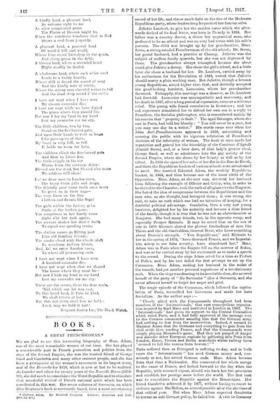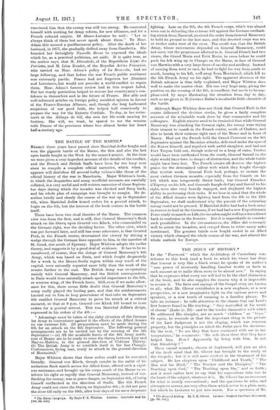BOOKS.
A GREAT FRENCHWOMAN..
Ws: are glad to see this interesting biography of Mane. Adam, ono of the most remarkable women of our time. She has played
considerable part in French journalism and politics from the Boys of the Second Empire, she was the trusted friend of George Sand and Carnleate and many other eminent people, and she has been a protagonist of the woman's movement in its largest sense, and of the Revanche for 1870, which is now at last to be realized. As founder and editor for twenty years of the Nouvelle Revue (1870- 09), elm did much to consolidate the Third Republic and to stimulate that wonderful revival of French national spirit which has been manifested in this war. Her seven volumes of Souvenirs, on which Miss Stephens's book is necessarily based, form a most entertaining • Atalanta Adam. Icy Wislirrd Eteidwas. London: assinna2 sad 11211. nos. est. record of her life, and throw much light on the rise of the Moderate Republican party, whose leaders long frequented her famous sales. Juliette Lambert, to give her the maiden name which she after- wards docked of its final letter, was born in Picardy in 1836. Her father was a country doctor, a clever but unpractical man, who professed to be an atheist and was on very bad terms with his wife'a parents. The child was brought up by her grandmother, Mme. Seron, a strong.minded Frenchwoman of the old school ; Dr. Seron, her genial husband, had a practice at Chauny. Juliette wee the subject of endless family quarrels, but she wan not depressed by them. The grandmother always triumphed because also alone could give Juliette a dowry. She chose the girl's school, and a little later she chose a husband for her. Dr. Lambert, carried away by his enthusiasm for the Revolution of 1898, vowed that. Juliette, should marry a plain working man. But Juliette, though a fervent young Republican, aimed higher than that, and dutifully accepted the good-looking barrister, Larneasine, whom her grandmother favoured. Unhappily, this marriage was a disaster, as Dr. Lambert had foretold. Lameasine was unsympathetic and mercenary, and his death in 1867, after a long period of separation, eamo as a welcome relief. The young wife found consolation in literature ; and her sad experience stimulated her to defend her own sea in a reply to Proudhon, the Socialist philosopher, who is remembered mainly by his maxim that " property is theft." The aged Bbranger, whom sit., met in Paris, had told her bluntly : " You will never be a poet, but you may one day be a writer." His words came true when her Mies Anli-Proudhoniennes appeared in 1858, astonishing and amusing the public with its vigorous refutation of Proudhon's doctrine of the inferiority of woman. The book at once made her reputation and gained her the friendship of the Comtesse d'Agoult (Daniel Stern), and, at a later date, of that lady's greater rival. George Sand, as well as admittance into the gay society of the Samna Empire, where also shone by her beauty as well as by her talent. In 1804 she opened her saten at her flat in the Rue do Riven, and there the Republican lenders of various; schools wore accustomed to meet- Site married Edmond Adam, the wealthy Republican banker, in 1868, and thus became one of the inner circle of the Opposition. Mine. Adam, as she now was, deterred her Imsband from following the example of 011ivier and Gr5vy, who, ha order to be elected to the Chamber, took the oath of allegiance to the Emperor. She hated the ides of compromise between the Republicans and the man who, as she thought, had betrayed then; it was wrong, she said, to take an oath which one had no intention of keeping, for a doubtful political advantage. Gambetta, then a very raw young barrister, delighted her by his audacity and became a close friend of the family, though it is true that he was not an attstentionniste or Nonjuror. She bad many friends, too, in the opposite camp, and especially Prosper Merinnlo. It may be noted that on the eve of war in 1870 Marimee shared the gloomy forebodings of men like Thiers and the old Garibaldian, General Bisio, who knew something about Prussia's strength. "You Republicans," said Mdrimee to her in the spring of 1870, " have disarmed France, and we Imperial- ists, asleep in our false security, have abandoned her." Mine. Adam was in Paris when the Empire fell on the morrow of Sedan, and was so far carried away by her excitement as to make a speeds to the crowd. During the siege Adam acted for a time as Prefect of Police, and by his tact foiled the first attempt to set up tlis Commune. Mmo. Adam, seeking her husband in the midst of the tumult, had yet another personal experience of a revolutionary mob. When the siege was drawing to its inevitable close, she avowed herself of the party of No Surrender " (Lead Otaranoe), and she never allowed herself to forget her anger and grief.
The tragic episode of the Commune, which followed the capitu- lation of Paris, intensified her bitterness and made her bate Socialism. As the author says :—
" Closely allied with the- Communards throughout had been members of the.' Internationale,' that vast cosmopolitan organisa- tion inspired by Karl Marx and instituted in London in 1862. Tho ' Internationale ' had given its support to the Central Committee which ruled Paris, and it had fully approved of the menage sent to the German commander assuring him that the German army had nothing to fear front the insurrection. Indeed, it seemed to Madeira° Adam that the Germans had everything to gain from the civil strife then rending France, and that the Communards were simply playing Bismarek's game. Had they not purged of danger and disorder other European capitals by gathering into Paris from London, Rome. Vienna and Berlin anarchists whose railway fares seemed to fall like manna from heaven ' "
Paris suffered then as Petrograd is suffering to-day, and in bah cases the " Internationale" has used German money and, con- sciously or not ilea nerved German ends. Mme. Adam became from that time a Nationalist. She consecrated her whole energy to the cause of France, and looked forward to the day when the Republic, with renewed vigour, should Win back her lent provinces and establish her prestige anew before the world. The first task was to consolidate the Republic against the Monarchists. Her friend Gambetta achieved it by 1877, without having to resort to violence against MacMahon, as seemedpoasible alter the eleetionsot that critical year. But when Mme. Adam expected Gambetta to vureue an anti-German policy, he failed her. A visit to Germany
convinced him that the enemy was still too strong. He contented himself with working for Army reform, for new alliances, and for a French colonial empire. Of Maser-Lorraine he said : " Let us always think of them but never speak about them." To Mme. Adam this seemed a pusillanimous policy. After the death of her husband, in 1877, she gradually drifted away from Gambetta. She founded her fortnightly Nouvelle Revue to expound the ideals which he, as a practical politician, set aside. It is quite true, as the author says, that M. Deroulede, of the Republican Ligus dee Pahlavi, and M. Leon Daudet, of the Royalist Adios Franesise, who carried on Mme. Adam's policy of La Revanche, had no large following, and that before the war French public sentiment was extremely pacific. France had not forgotten her Alsatians and Lorrainers, but would not provoke a world-conflict to regain them. Mme. Adam's famous review had in this respect failed. But her sturdy patriotism helped to restore her countrymen's con- fidence in themselves and in the future of France. Her able and well-informed articles on foreign policy moulded opinion in favour of the Franco-Russian Alliance, and, though she long harboured suspicions of our good faith, she helped half consciously to prepare the way for the Entente Cordiale. To-day, in her retire- ment at the Abbey° de Gil, she Bees her life-work nearing its fruition. She will, we trust, be spared to see the reunion with France of the provinces whose loss almost broke her heart half-amentury ago.



























 Previous page
Previous page